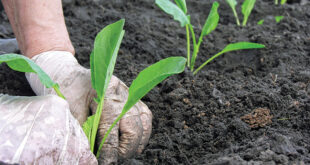
By Sue Odland
As summer temperatures rise, bountiful gardens bloom, and garden pests do too. Keep your garden safe from chemicals this season by using the wisdom of Mother Nature to provide effective, natural pest control. Using a combination of the following strategies will provide your plants with well-rounded protection against unwelcome garden visitors this year.
Claim the Space
Strong garden borders keep vegetables in and unwanted guests out. Create a defined edge around the garden perimeter for easier mowing and to provide a solid barrier against creeping weeds. Use logs, bricks, rocks, or edging material, either found or purchased, to create the border. The addition of simple, inexpensive fencing like chicken wire or small foldable fences will provide extra protection from inquisitive pets and local wildlife.
Good Neighbors
Planting vegetables that complement each other together produces healthier plants, better yields and a strong defense against garden bugs and pests. However, some plants do not grow well with others. Before planting, check the In-Depth Companion Planting Guide at motherearthnews.com to ensure the pairing of friends, not foes.
A few examples of friendly pairings include:
Beans with potatoes, carrots with leeks, dill with cabbage or cucumbers, spinach with radishes, tomato with basil; onions and garlic with tomatoes, broccoli, peppers, cucumbers, spinach or strawberries. However, do not plant onions and garlic with beans, peas, sage, or asparagus, as the onions and garlic will inhibit the other plants’ growth.
Rare Finds
Stop the war on weeds. Chemical-free lawns and gardens abound with nutritious and delicious edible delicacies including: dandelions, chickweed, purslane, lamb’s quarters, clover, Creeping Charlie, wild violets, and many more. Eat them raw, steamed, or sautéed. Savor them in salads, juices, casseroles, or teas. These earth treats pack a tremendous amount of vitamins, nutrition, and health benefits. Search online for helpful identifying photos, nutritional facts, and recipes.
The Strength of Blooms
Adding specific flowers to the garden will create an attractive garden defense. Certain strong floral scents repel harmful beetles, aphids, fleas, moths, and other plant- damaging insects. The blooms will also supply vital nutrition for bees, butterflies, and local wildlife. Proven varieties include: marigolds, chrysanthemums, lavender, nasturtiums and petunias. Visit growveg.com/guides/flowers-for-vegetable-gardens to learn more about the specific qualities of each beneficial bloom.
Winged Defenders
Beneficial Insects are an excellent form of organic pest control. These favorable garden protectors search out and eliminate harmful bugs from your flowers and vegetables. They can be purchased at local garden and feed stores, or ordered online. To learn more about these remarkable garden defenders, explore planetnatural.com, or gardeninsects.com. Popular species of beneficial insects include:
Ladybugs – these attractive garden visitors control aphids (tiny white flies that attack tomatoes). Purchase them in bulk. Release them into your garden in early evening to allow time for them to find food and water.
Praying Mantis – this carnivorous insect reduces bug populations naturally, and helps maintain a healthy ecological balance in the garden. Purchase the praying mantises as eggs; place in the garden, or around the yard. The eggs will hatch after 4-6 weeks of warm weather, producing hundreds of small protectors ready to patrol the garden.
Beneficial Nematodes – these tiny microscopic roundworms can destroy over 200 species of harmful insects, including caterpillars, grubs, Japanese beetles, and other unwelcome in-ground insects. Add beneficial nematodes to the garden in the evening by mixing them with water, then spray or sprinkle them onto areas with noticeable or suspected insect infestation.
Garden Folk Wisdom
Use these time-tested tips to deter garden pests:
Slugs – There are numerous natural methods to eliminate this notorious garden pest including; beer traps, seaweed mulch, copper borders, and protective aluminum foil shields. Search for natural slug control online to learn more about these easy DIY techniques.
Flying insects – Make a simple insecticidal soap to eliminate aphids and other soft- bodied insects from garden and household plants. Add 2 tbsp. of dishwashing soap to 1 gallon of water. Pour into a spray bottle; spray entire plant, soaking both sides of the leaf and stem. Wait 2-3 days, repeat as needed.
Birds – Protect ripe berries from birds by placing floating row covers over the plants and bushes.
Squirrels – Add an artificial owl near tomatoes to protect ripening fruits from squirrels. The owl is a natural predator of squirrels, rabbits, and other small animals.
This season try simple, natural solutions from Mother Nature to bring peace to your garden space.
Sue Odland is a freelance writer and Midwestern gardener.
 Conscious Community Magazine Dedicated to Elevating Consciousness
Conscious Community Magazine Dedicated to Elevating Consciousness




